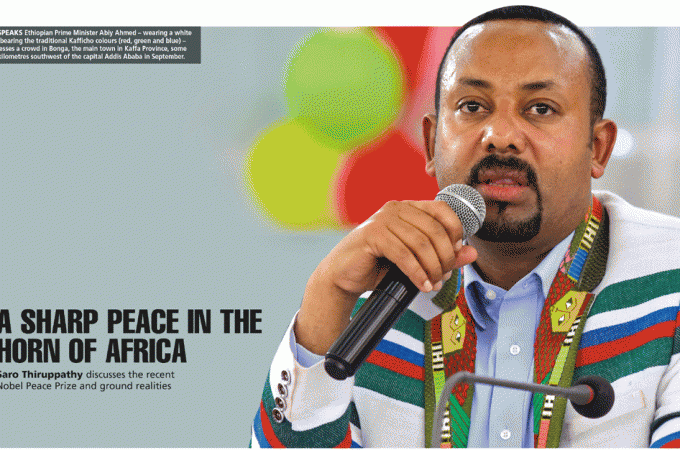THE NOBEL LAUREATE
A SHARP PEACE IN THE HORN OF AFRICA
Saro Thiruppathy discusses the recent Nobel Peace Prize and ground realities
In October, the Norwe-gian Nobel Committee announced that Prime Minister Abiy Ahmed Ali of Ethiopia had been awarded the 2019 Nobel Peace Prize for his work promoting peace between his country and Eritrea. The committee also recognised his mediation work in an ongoing maritime boundary dispute between Kenya and Somalia, as well as Abiy’s support to bring the Sudanese government and rebels to the negotiating table.
 Abiy has been trying to right many wrongs both at home and in the Horn of Africa. In addition to lifting Ethiopia’s state of emergency, he has granted amnesty to many thousands of political prisoners, removed media censorship, legalised opposition groups that had been outlawed, and sacked military and public service officials who were suspected of corruption.
Abiy has been trying to right many wrongs both at home and in the Horn of Africa. In addition to lifting Ethiopia’s state of emergency, he has granted amnesty to many thousands of political prisoners, removed media censorship, legalised opposition groups that had been outlawed, and sacked military and public service officials who were suspected of corruption.
The prime minister also made history by staffing half his cabinet with women ministers.
But the road has not been easy and nor have all Abiy’s efforts delivered the anticipated outcome. At home, his move to create more political space for opposition groups has resulted in an escalation of violence by extremist factions like the Oromo Liberation Front (OLF) as it pursues power through force.
Ethiopia has more than 80 ethnic groups with many bearing grievances and different political ideologies that underlie the main conflicts in the country. The clashes due to a land dispute between the Oromo people and ethnic Somalis are deadly; and since Abiy is himself an Oromo, he had made its resolution a priority. But the OLF didn’t seem impressed with Abiy’s intentions and a few months after he was appointed prime minister, it took to the streets and ignited a conflict with the youth in Addis Ababa, which resulted in several deaths.
The number of dead in the Oromia Region at the end of October exceeded 65, according to the regional police chief. The country has also seen several assassinations – and Abiy himself escaped an assassination attempt in July last year.
By December 2018, an estimated 2.9 million Ethiopians had fled their homes, making it one of the world’s worst internal displacements.
PEACE AND UNITY Meanwhile, Abiy extended an olive branch to President Isaias Afwerki of Eritrea in line with his call for medemer or ‘a strong unity.’ When Afwerki accepted the hand of friendship, there was a collective sigh of relief in both countries.
The Chair of the Norwegian Nobel Committee Berit Reiss-Andersen noted: “In Ethiopia, even if much work remains, Abiy Ahmed has initiated important reforms that give many citizens hope for a better life and a brighter future.”
In July, the 2018 Eritrea-Ethiopia peace summit took place in the Eritrean capital Asmara. The two leaders signed a joint declaration, which formally ended a border conflict between Eritrea and Ethiopia, and restored full diplomatic relations between the two nations. They agreed to open their borders to facilitate unhindered movement of people, goods and services.
It was also decided that all issues relating to the Eritrean-Ethiopian War (1998-2000) and the subsequent Eritrean-Ethiopian border conflict (2000-2018) would be put to rest. In November, the UN Security Council lifted its nine year arms embargo and sanctions against Eritrea.
But six months after signing the peace agreement, Eritrea started unilaterally closing its border crossings with Ethiopia. In December, spokeswoman for the regional administration in the border region of Tigray – Liya Kassa – said: “The restrictions have only been imposed on the Eritrean side and we didn’t receive any prior notice.” By July this year, all four border crossings had been shut and they remain so to this day.
ARMED CONFLICT It’s necessary to go back in history to fully appreciate the Eritrean-Ethiopian conflict and Abiy’s gesture of goodwill. In 1993, Eritrea gained independence from Ethiopia after the 30 year Eritrean War of Independence. But subsequent border skirmishes continued to cause tension between the two countries and in May 1998, Eritrea invaded Ethiopia.
The Ethiopian-Eritrean War resulted in the deaths of between 70,000 and 100,000 people, and Ethiopia ended up occupying a third of Eritrea, displacing more than 650,000 people.
Two years later, the two countries inked the Algiers Agreement in 2000 whereby they agreed to submit to binding arbitration to resolve their boundary and restitution issues. The Permanent Court of Arbitration, which is an intergovernmental organisation based in The Hague, awarded the disputed territory to Eritrea.
Though the Boundary Commission of the Permanent Court of Arbitration had ruled that Badme – which is the disputed territory that lies at the heart of the conflict – belongs to Eritrea, Ethiopia continues to occupy it (including the town of Badme) even after the joint declaration was signed in July.
In the years of conflict, Eritreans have suffered untold hardships as a result of forced conscription as prisoners of conscience and from acute deprivation. The brief reopening of the border in 2018 resulted in a mass exodus of Eritreans crossing over to Ethiopia in a bid to break free of the authoritarian government in Asmara.
And although Abiy has grown in international stature, his popularity at home is plummeting.
The next milestone is the election next year, which will determine the road ahead for Ethiopians. Indeed, these are gloomy days for the 2019 Nobel Laureate.







Leave a comment